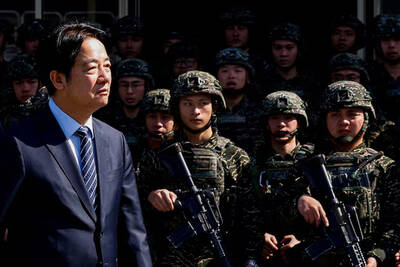The government’s proposed policy of using the weight of unmanned aerial vehicles (UAV), also known as drones, to determine what rules they come under is not feasible, the Taiwan UAV Development Association said, adding that local governments lack the skills and personnel to regulate the devices.
Based on amendments to the Civil Aviation Act (民用航空法) proposed by the Executive Yuan, the Civil Aeronautics Administration (CAA) is to be in charge of regulating drones weighing 15kg or more, while those weighing less than 15kg would be supervised by local governments.
Apart from restricted airspace, local governments would be able to draw up their own list of areas where drones would be prohibited, the proposal said.
The association’s chairman, former CAA director-general Billy Chang (張國政), said that there should only be one government agency regulating drones.
CAA Flight Standards Division Director Clark Lin (林俊良) said that the CAA has withdrawn previously proposed amendments, adding that it is to hold a public hearing next month on the revised edition.
The Flight Standards Division consulted regulations on drones in the US and the EU before revising its proposal, Lin said.
He said the US so far has only set rules requiring drone operators to register the devices, but it has yet to stipulate rules regulating drones used for commercial or leisure purposes.
While the EU lays out relatively specific rules on drone use, Lin said that it also includes a caveat that it would revise the rules contingent on the development of the technology.
The amendment should give the CAA more flexibility and sufficient authorization so that it can stipulate rules of enforcement that reflect advances in technology in a timely manner, Lin said.
On the new amendment, Lin said that the CAA is to be in charge of stipulating rules governing the registration, management and operation of drones, adding that the agency would simultaneously present the drafts of the amended act and the enforcement policies.
Citing the previous proposal, Lin said that drones are in principle only allowed to fly during daytime hours below 400 feet (121.92m) and within visual range. They are not allowed to fly above crowds and must keep their distance from buildings.
If a drone is to fly at night, above a crowd or outside of visual range, special permissions must be obtained from the CAA or the local government, Lin said.
As an example, Lin said that drone operators would have to apply for permission from the CAA if a flight was to take place at night or near an airport.
Should a flight take place above a crowd during a demonstration or rally, drone operators must secure permission from the local administration, he said.
“Each local government should make public a list of areas where the use of drones is permissible. We [the CAA] would have no idea about what places would be appropriate in each city or county for such activities,” Lin said. “We also need the assistance of local governments to help crack down on illegal drone use.”
The association, which was officially established yesterday, said that it would seek to become a government-authorized agency to certify people to operate drones.
Those with a valid license issued by the agency would be able to fly drones in Taiwan, China and Hong Kong, it added.
“We hope that the association would bring together manufacturers, parts suppliers and drone operators to facilitate the research and development of the industry,” Chang said.

The Taipei Mass Rapid Transit (MRT) Wanda-Zhonghe Line is 81.7 percent complete, with public opening targeted for the end of 2027, New Taipei City Mayor Hou You-yi (侯友宜) said today. Surrounding roads are to be open to the public by the end of next year, Hou said during an inspection of construction progress. The 9.5km line, featuring nine underground stations and one depot, is expected to connect Chiang Kai-shek Memorial Hall Station to Chukuang Station in New Taipei City’s Jhonghe District (中和). All 18 tunnels for the line are complete, while the main structures of the stations and depot are mostly finished, he

The first global hotel Keys Selection by the Michelin Guide includes four hotels in Taiwan, Michelin announced yesterday. All four received the “Michelin One Key,” indicating guests are to experience a “very special stay” at any of the locations as the establishments are “a true gem with personality. Service always goes the extra mile, and the hotel provides much more than others in its price range.” Of the four hotels, three are located in Taipei and one in Taichung. In Taipei, the One Key accolades were awarded to the Capella Taipei, Kimpton Da An Taipei and Mandarin Oriental Taipei. Capella Taipei was described by

Minister of Economic Affairs Kung Ming-hsin (龔明鑫) yesterday said that private-sector refiners are willing to stop buying Russian naphtha should the EU ask them to, after a group of non-governmental organizations, including the Centre for Research on Energy and Clean Air (CREA), criticized the nation’s continued business with the country. While Taiwan joined the US and its Western allies in putting broad sanctions on Russia after it invaded Ukraine in 2022, it did not explicitly ban imports of naphtha, a major hard-currency earner for Russia. While state-owned firms stopped importing Russian oil in 2023, there is no restriction on private companies to

President William Lai (賴清德) is expected to announce a new advanced “all-domain” air defense system to better defend against China when he gives his keynote national day speech today, four sources familiar with the matter said. Taiwan is ramping up defense spending and modernizing its armed forces, but faces a China that has a far larger military and is adding its own advanced new weapons such as stealth fighter jets, aircraft carriers and a huge array of missiles. Lai is expected to announce the air defense system dubbed “Taiwan Dome” in his speech this morning, one of the sources said. The system